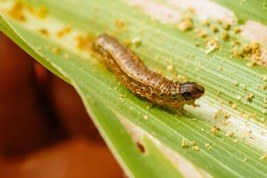This is the seventh short news article written by students, during the professional development class of Spring 2023, about each other's research.

Anam Fatima is working on fall armyworm control.
Student Spotlight: Anam Fatima
Written by: Jared Adam
A pest among pests. A caterpillar above all others. A culprit, worth billions. Across the world, in every country growing corn, cotton, or soybeans, fall armyworm (Spodoptera frugiperda) makes its presence known. Consuming agronomic cash crops at an alarming rate, in sub-Saharan Africa alone, fall armyworm is responsible for between $1 and $4.6 billion annually in corn damage (CABI 2018).
Anam Fatima is a first year PhD student at The Pennsylvania State University studying in the Felton Lab. She says, “Hippocrates famously said, ‘Let food be thy medicine and let medicine be thy food.’ I think to myself: why not extend this concept to our crops? Perhaps a specific diet of our crops can enable them to strengthen their defenses sufficiently.” Anam will be studying how the variation in plant diet components (e.g., nutrients such as Nitrogen: nitrate NO3-, ammonium NH4+, Phosphorus: P, Potassium: potassium sulfate K2SO4, etc.) might help plants defend against pests like fall armyworm.
To do this, Anam will investigate fertilizer manipulations of corn plants to assess if this nutrient change will make said crops more resistant or tolerant to fall armyworm. Prior research suggests that due to the protein nature of plant defense chemicals, fertilizer type and quantity can positively influence the plant’s ability to defend itself, thus minimizing, if not eliminating, the pressures of this caterpillar. However, more work is needed to determine which nutrients have the greatest effects on plant defenses. These results, in turn, will shed light on the potential benefits of plant defense constraints for herbivore host-plant selection based on nutrient access. Her work will be geared towards identifying the key component(s) of fertilizers responsible for the adoption of plant resistance against fall armyworm.
This direction of resistance investigation is very novel and thus there is much to discover. With a background in biochemistry and nutrition, Anam is ready. With her expertise, she will be able to interpret and understand the mechanisms behind the adapted resistance to fall armyworm, thus leading to recommendations for farmers. She is motivated by the necessity to help growers in need of more environmentally friendly pest control measures. Anam says, “I am driven by a sense of giving back to the community that raised me and motivated by the fact that we need to find ecofriendly ways to preserve our crops in the face of increasing global warming and pollution.” It is imperative that we work towards minimizing our synthetic pesticide applications and master our nutrient applications.
Anam will be taking this project to the field this season with the goal of mimicking the systems growers are currently implementing. With a little luck and some hard work, she will leave Penn State having contributed greatly to the many farmers under pressure from fall armyworm. She will become the James Bond of integrated pest management.
At present, this research is made possible by her funding source, Penn State.

